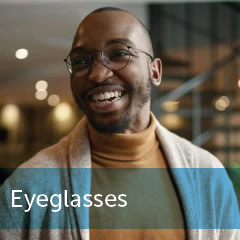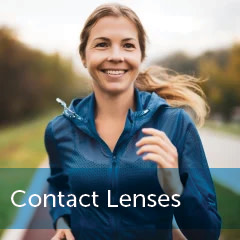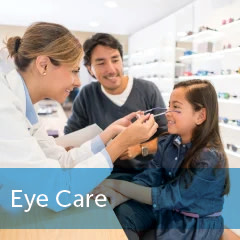50% OFF a Complete Pair of Glasses
*Restrictions apply. Click here for details.
At EyeCare Associates, we want you to feel empowered to make informed decisions about your eye health. From overall eye care, glasses, and contacts, learn more through our eye care resources.
Latest Blog Posts

Do Eyeglasses Make Your Eyesight Worse?
A myth may stop people from wearing their glasses: that they make your sight worse. Learn why it can feel this way and what really happens with EyeCare Associates.

The Importance of Annual Eye Exams
Annual eye exams are essential for protecting your vision and identifying eye conditions before they worsen. Learn more about eye exams with EyeCare Associates.

Prioritizing Children’s Toy Safety for Healthy Eyes
Toy-related injuries happen more often than you think, and the wrong toy can harm your child’s vision. Learn more about toy safety with EyeCare Associates.

The Importance of Vision Insurance for Kids
Kids rely on their vision for learning and playing, making access to eye care essential. Learn more about kids’ vision insurance with EyeCare Associates.

How to Use Vision Insurance
Vision insurance can significantly lower your out-of-pocket costs for eye care. Learn how to use your benefits with EyeCare Associates.
How to Rest Your Eyes
From taking breaks to adjusting office lighting, reducing strain and resting your eyes is essential for comfortable vision. Learn more with EyeCare Associates.

Do You Need Multifocal Contacts?
Multifocal contacts provide clear distance vision and seamless focus, but how do you know if you need them? Learn more with EyeCare Associates.

What is Vision Awareness Month?
October is National Vision Awareness Month, the perfect time to learn what to watch for that may indicate a vision problem. Learn more with EyeCare Associates.
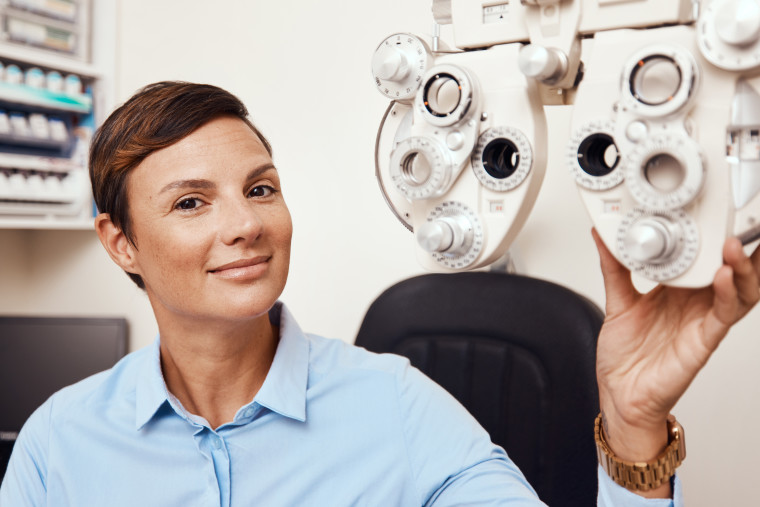
Why Do Eye Doctors Dilate Your Eyes?
Whether you've had a dilated eye exam in the past or this is your first time, you might have some questions about your upcoming eye exam. Why do eye doctors dilate your eyes? What vision problems are they looking for? Do you need to have your eyes dilated every year?

What is National Eye Health Week?
Observed each year from September 22-28, National Eye Health Week is about the importance of eye health and regular eye exams. Learn more with EyeCare Associates.

How to Choose the Best Sunglasses for Driving
Looking for sunglasses to protect your eyes while driving? Learn what to look for in driving sunglasses and how to choose the best pair with EyeCare Associates.

What is Neuro-Optometry?
Neuro-optometry is a specialty that focuses on vision problems caused by brain injuries or neurological conditions. Learn more with EyeCare Associates.

How to Stop Watery Eyes
Do you have watery eyes that just won’t stop? Learn about tried-and-true home remedies and when you should see a doctor with the experts at EyeCare Associates.

How to Prevent Sunburned Eyes
Did you know your eyes can get sunburned? Photokeratitis can be painful, but you can prevent it with the right strategies. Learn more with EyeCare Associates.

Can Your Eyes Change Color?
Have you noticed that your eye has become lighter or darker in color? Learn more about medical conditions that can cause eye color to change from EyeCare Associates.

Is Swimming with Contact Lenses Safe?
Want to enjoy a day at the pool but need your contacts to see? Learn if you can swim with contact lenses and some helpful tips with EyeCare Associates.

Dry Eye Awareness Month: How to Treat Dry Eyes
Dealing with red, scratchy eyes? This Dry Eye Awareness Month, learn the symptoms of dry eyes and how to find relief with EyeCare Associates.

What are the Benefits of Sunglasses?
Sunglasses are an essential part of any wardrobe for style and safety. Learn the benefits of wearing sunglasses to protect your eyes with EyeCare Associates.

Are Contacts Better Than Glasses?
Trying to decide between glasses and contacts? While both effectively correct vision, each has pros and cons. Explore each option with EyeCare Associates.

How To Read Your Contact Lens Prescription
Learn how to read a contact lens prescription including terms like OD, OS, SPH, PWR CYL and more from the eye doctors at EyeCare Associates.

Cataract Awareness Month: A Complete Cataract Guide
While cataracts are the leading cause of blindness, they are highly treatable. Learn the ins and outs of cataract causes and treatments with EyeCare Associates.

The Best OTC Eye Drops: A Comprehensive List
Over-the-counter (OTC) eye drops can soothe allergies and dry eyes, but which options are the best? Discover the top brands for relief with EyeCare Associates.
Contact Lenses for Kids: Tips and Best Practices
Not all kids want to wear glasses! Learn the best contact lenses for kids, best practices to follow, and how to use them effectively with EyeCare Associates.

How Do Eyes Work? A Comprehensive Guide
Our eyes are our windows to the world around us, but how do they really work? Learn how eyes function and how you can keep them healthy with EyeCare Associates.
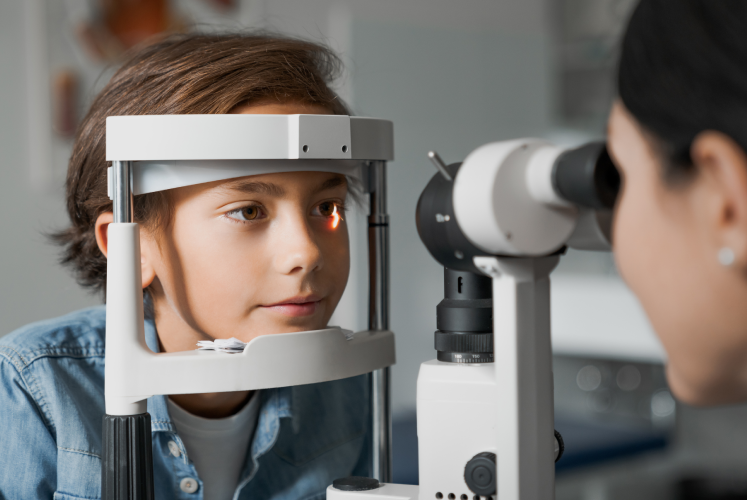
Exploring the Best Eyeglasses for Teens
Not all eyeglasses fit the same and each teen has a different face shape. Learn which eyeglasses will look best on you with EyeCare Associates.

What Can Too Much Screen Time Do to Kids?
It’s hard to avoid screens in the age of digitalization. But how is it impacting teens, and how much screen time is too much? Learn more with EyeCare Associates.

Does Playing Outdoors Improve Children's Eyesight?
More and more kids are being diagnosed with myopia, younger than ever before. See how playing outdoors may help reverse this trend with EyeCare Associates.

The Importance of Eye Care for Kids
Kids' eye doctors specialize in eye exams that are designed for children. Learn more about the importance of a kids' eye exam at EyeCare Associates.

What is a Pediatric Eye Exam?
Are you wondering if your child needs an eye exam and what to expect at an appointment? Learn more about pediatric eye exams the eye doctors at EyeCare Associates.

Recognizing Early Signs of Children's Eye Conditions
Your child’s eyes are their windows to the world around them. Learn about common and uncommon eye issues in kids and how to spot them with EyeCare Associates.

Prioritize Eye Health During Save Your Vision Month
Every March, we observe Save Your Vision Month, a time to focus on eye health and vision care. Learn how to protect your eyes year-round with EyeCare Associates.

What Does a Contact Lens Exam Cost?
Determining the best contacts for your eyes through a comprehensive eye exam comes with various costs. Learn the typical expense range with EyeCare Associates.

Winter Dry Eyes: Symptoms, Causes, and Treatments
Do your eyes start to itch more during the winter months? It could be winter dry eye. Learn more about this condition and how to treat it with EyeCare Associates.

Supporting Your Child’s Vision: Eye Health for School-Aged Kids
Healthy vision is essential for learning, reading, and writing. Learn how to support your child’s academic success and eye health with EyeCare Associates.

Nurturing Infant Vision: Eye Health from Birth to Age 6
Children’s eyes develop rapidly in their first few years of life. Learn the milestones and how to support their vision development with EyeCare Associates.

Children's Vision 101: Essential Insights for Parents
Children’s eyes grow and change rapidly as they age. Learn how to protect and support your child’s vision at every age with the experts at EyeCare Associates.

Reasons for Blurry Vision in One Eye
Is your vision blurry in only one eye? Learn more about the causes of this condition and when it is considered a medical emergency with EyeCare Associates.

Optometrist vs. Ophthalmologist: What’s the Difference?
Optometrists and ophthalmologists are both eye care specialists, but which should you see? Explore the differences and when to visit each with EyeCare Associates.

What is Vision Therapy?
Vision therapy isn’t just eye exercises; it improves visual performance skills. Learn how vision therapy strengthens brain-to-eye function with EyeCare Associates.

Do Blue Light Glasses Work and Are They Worth It?
Exposure to blue light from screens can cause digital eye strain and disrupt sleep patterns. Learn how blue light glasses can help with EyeCare Associates.

How Often Should You Replace Your Contacts?
Contacts can seamlessly correct your vision but changing them regularly keeps your eyes healthy. Learn when to replace your contacts with EyeCare Associates.

Does Contact Solution Expire? Signs You May Need a New Bottle
Contact solution is an essential component of maintaining clean contacts. Learn more about expired solution and when to buy a new bottle with EyeCare Associates.

7 Reasons You May Benefit from Single Use Contact Lenses
Single use contact lenses require less maintenance and offer enhanced hygiene. Explore the 7 significant advantages of single use contacts with EyeCare Associates.

What is Wet Macular Degeneration?
Wet macular degeneration is a leading cause of blindness. Learn about this severe form of AMD, including its symptoms and treatment.
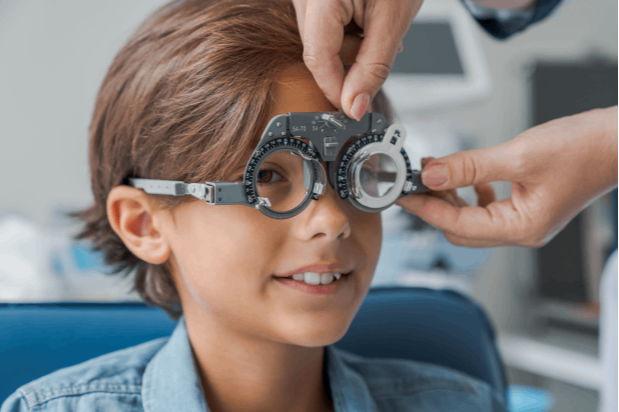
Protect Your Kids’ Eyes This Children’s Eye Health and Safety Month
August is Children’s Eye Health and Safety Month. Learn how to keep your kids’ eyesight clear and safe throughout the year with EyeCare Associates.

What Are Common Dry Eye Symptoms?
Dry eyes are a common eye condition that occurs when your eyes don’t make enough tears. Learn the causes and symptoms from the experts at EyeCare Associates.
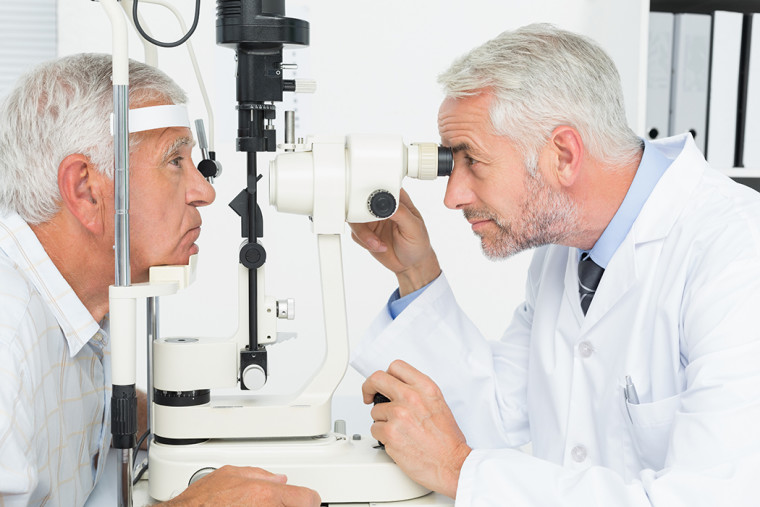
Diabetic vs. Regular Eye Exams: What's the Difference?
Everyone needs to get regular eye exams, but if you have diabetes, you'll need to get frequent specialized exams designed to detect diabetic eye conditions.

Healthy Vision Month: The Importance of Clear, Healthy Sight
May is Healthy Vision Month, the perfect time to schedule an eye exam! Learn more about what healthy vision is and how you can protect your sight with EyeCare Associates.

Understanding the Different Types of Cataracts
Cataracts cloud your vision, but various types of cataracts have unique impacts on your sight. Explore the common types of cataracts with EyeCare Associates.

Is UV Light Bad for Your Eyes?
Summer is fast approaching, which means having more fun in the sun. Learn how to protect your eyes from harmful UV rays to keep your vision safe.

Myopia vs. Hyperopia: What's the Difference
Refractive errors are common vision conditions that affect how your eyes focus light and impact the clarity of your vision. Two of the most common refractive errors are myopia and hyperopia, each presenting unique challenges and characteristics.

What is Degenerative Myopia
Often referred to as pathological or progressive myopia, degenerative myopia is a specific form of nearsightedness. Nearsightedness, or myopia, is a prevalent vision issue where individuals can see objects close to them clearly, but those at a distance become blurred.

Presbyopia vs. Myopia: What's the Difference
Refractive errors are common occurrences, impacting how your eyes focus light and the clarity of your vision. Two of the most prevalent types of refractive errors are presbyopia and myopia, each with distinct characteristics and implications for your eye health.

Vision Protection in Athletics: Sports Eye Safety Month
Sports can pose a significant risk to your vision, which is why we observe Sports Eye Safety Month in April. Learn how to protect your vision while competing.

What is Seasonal Allergic Conjunctivitis (SAC)?
Seasonal Allergic Conjunctivitis can irritate your eyes and affect your enjoyment of the changing seasons. Explore symptoms and treatment with EyeCare Associates.

Celebrate World Optometry Day
World Optometry Day is on the 23rd of March this year, and EyeCare Associates plans to spend it educating our patients and community about the importance of maintaining healthy vision.

A Guide to Workplace Eye Wellness Month
March is Workplace Eye Wellness Month, and at EyeCare Associates, we understand the significant role that eye health plays in your overall well-being, especially in the workplace.

How to Protect Your Eyes During The 2024 Solar Eclipse
This rare astronomical event where the Moon perfectly blocks out the Sun is set to take place on April 8, 2024. Learn More about how to properly observe the eclipse.

Common Causes of Glaucoma
Pinpointing the cause of glaucoma can be difficult because there are several forms of glaucoma with different triggers.

AMD Awareness Month
In the eye health calendar, February marks a significant period – AMD Awareness Month. EyeCare Associates takes this opportunity to focus on educating and raising awareness about Age-related macular degeneration.

Low Vision Awareness Month
Every February, Low Vision Awareness Month shines a spotlight on a crucial aspect of eye health that often goes unrecognized. Low vision, a condition affecting millions worldwide, is not just a matter of poor eyesight that can be corrected with standard glasses or contact lenses.

What is Pink Eye?
Ever had a morning where you wake up, head to the bathroom, and find yourself facing a red, irritated eye in the mirror? Known as conjunctivitis or “pink eye,” this common eye condition can turn an ordinary day into one filled with discomfort and squinting.
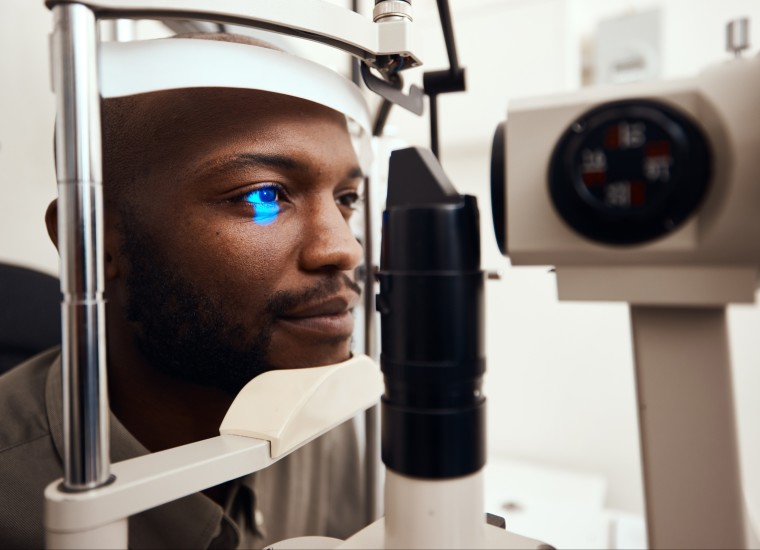
What is Night Blindness? How to See Clearly in the Dark
Nyctalopia, or night blindness, is an eye condition that makes it difficult for people to see in dark or dimly lit areas. For those with night blindness, navigating darkness is similar to driving with dim headlights or only using a few candles in a power outage.

What is Snow Blindness and How Can You Prevent It?
The winter season brings beautiful snow and holiday cheer but also opens the door for a temporary yet painful eye condition known as photokeratitis, or snow blindness. Cause primarily by the reflection of ultraviolet (UV) rays off snow and ice.

Celebrate Glaucoma Awareness Month with an Eye Exam
January is the time to make resolutions for the coming months and reset after a busy year, but it also is Glaucoma Awareness Month, a time to shine a light on one of the leading causes of irreversible blindness worldwide.

Understanding the Benefits of Polarized and UV Protection Lenses
Although both lenses offer protection against the sun, polarized and UV lenses differ. Continue reading to learn the differences between UV protection and polarized lenses with the eye doctors at EyeCare Associates.

What Does It Mean to Have 20/20 Vision?
About one-third of Americans have 20/20 vision. Learn more about what that means with EyeCare Associates.

How Do Glasses Work?
Chances are that you or someone you know wears eyeglasses each day. A large percentage of the population requires eyeglasses for vision correction, as they make it possible for those with refractive errors to see clearly. But how do glasses work? Continue reading to learn more from your trusted eye doctors at EyeCare Associates.

Helpful Tips on How to Rest Your Eyes
Eye fatigue is a common problem that is often ignored. Find out how to rest your eyes with EyeCare Associates.

How To Fix Broken Glasses
Learn about some of the common ways that your glasses may break, plus ways that you or your local practice can fix them but reading the EyeCare Associates guide.

Telehealth For Eye Care
You have options to visit the doctor without even leaving your house! Learn more about telehealth with EyeCare Associates.

Vision Screening
An eye screening is not the same as a comprehensive eye exam. Learn what the differences are with EyeCare Associates.

Choosing Between Daily vs. Monthly Contacts
Daily and monthly contacts can both be beneficial, but choosing the right pair for you depends on your lifestyle and eye health. Learn more with EyeCare Associates.

How To Put In Contacts Safely
Knowing how to put in your contact lenses safely is an important part of your daily routine. Learn more by reading the EyeCare Associates guide to putting in contact lenses.

Celebrate World Sight Day on October 9th
World Sight Day is October 9th this year. Celebrate the importance of healthy vision with EyeCare Associates and learn how to keep your vision clear.

11 Facts About RGP Contact Lenses
Rigid gas permeable contact lenses, or RGP contact lenses, are different from soft contact lenses and not as well known. Learn more about these lenses.

Can You Sleep With Contacts In?
Is it okay to fall asleep with contacts in? Are you at risk for eye infections? Learn more from the doctors at EyeCare Associates about sleeping with contacts in.



